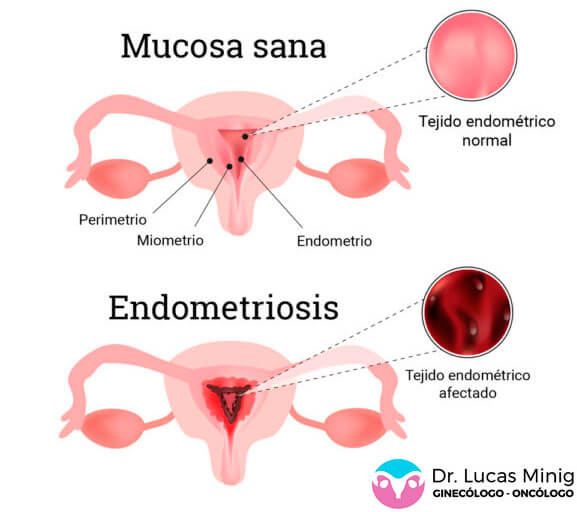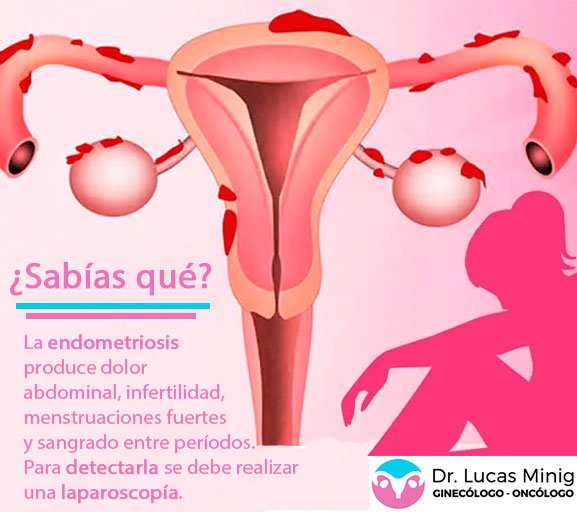What is endometriosis?
We constantly answer the question, what is endometriosis? Endometriosis is a disease in which tissue similar to the uterine lining grows outside of it. Moreover, endometriosis is a benign condition that affects young women before menopause. It depends on hormonal stimuli (estrogen) and thus it is definitely and spontaneously cured with menopause
Endometriosis Specialist
Lucas Minig specialist in the treatment of the disease “Endometriosis” surgeon in Valencia Spain
Request a quick appointment with the specialist in Endometriosis, Dr. Lucas Minig, an expert Gynecologist Oncologist in this type of cancer that is very common in women.
Appointment: Click to Request an Appointment for ovarian cancer in Spain.
Contact: +34 679 112 179
What Is The Endometrium?
The endometrium is a layer of cells that lines the uterine wall and that sheds monthly with each period. The most common sites of endometriosis are the ovary (in the form of cysts), or the peritoneum. However, endometrial tissue can be found in odd places such as the bowel, or even in the lung, and in extremely rare cases, in the eye.
What Causes Endometriosis?
While it is believed that endometriosis has a multifactorial origin, the only constant variable is the presence of estrogen. Therefore, it is a disease only active in women of reproductive age (between the first and last periods). There could be some molecular and genetic abnormalities, but they are still to be elucidated. On the other hand, it tends to affect women living in large cities, and with jobs of great responsibility.
10 most important facts to learn about endometriosis
Endometriosis appears when endometrial cells, the inner layer of cells lining the uterine cavity, reach other parts of the body. You can read more about this subject here.

Endometriosis diagnosis
The definitive diagnosis of the disease is made with a biopsy of the endometriosis implants inside the abdominal or pelvic cavities or after performing a cystectomy in the ovary.
While these procedures are performed through minimally invasive laparoscopic surgery, the diagnosis is generally made based on clinical suspicion. Thus, the surgical option is reserved for those women with ovarian cysts of a certain size who present with pelvic pain.
Endometriosis symptoms
Endometriosis is often asymptomatic in the great majority of women and it is never diagnosed. Nevertheless, a group of women can present symptoms that can affect, to a greater or lesser extent, their quality of life. It is important to also mention that the severity of symptoms does not often correlate with the severity of the disease.
It is often asymptomatic in the great majority of women but a group of them can present symptoms that can alter, to a greater or lesser extent, their quality of life.
The main symptoms of the disease include:
- Pain during periods that increases as the years go by.
- Chronic pelvic pain. (Between periods)
- Pain with sexual intercourse.
- Diarrhea or constipation, pain with defecation.
- Rectal bleeding during menses.
Do you have any of these symptoms?
Where can endometriosis be located?
The most frequent location of endometriosis is in the ovaries in the form of cysts with hemorrhagic content (blood accumulated over time). This is known as “endometrioma” or “chocolate cyst” because of its similarity to the contents of the cyst.
Endometriosis can also be located in the wall of the uterus, between the muscle fibers, in the form of small venous lakes. This localization is known as “adenomyosis“.
On the other hand, endometriosis can be located in the peritoneum, usually in the pelvis, in the form of implants or peritoneal nodules of various sizes (commonly a few millimeters). Said implants can be, in turn, superficial or deep depending on their ability to be implanted in the thin layer that internally covers the pelvic organs (or peritoneum).
Ultimately, endometriosis can infiltrate different organs of the pelvis in what is called “deep endometriosis”. In these cases, the implants are usually more prominent and can be located in the recto-vaginal space, being able to infiltrate the wall of the rectum, the vagina, or both. More rarely, they can invade the wall of the bladder or ureter.
Treatment of Uterine Polyps in the Endometrium, Valencia Spain
Dr. Lucas Minig is a specialist in the treatment of uterine polyps in the endometrium..
Request treatments to treat uterine polyps in Spain with expert doctors in the disease.
Therapeutic options for endometriosis
- Oral contraceptives: to suppress ovulation and menstruation to reduce pain severity.
- Drugs that block the production of ovarian hormones: it is a temporary treatment prescribed for 6 months. The goal is to stop the progression of the disease by producing transient menopause. It is a scarcely used treatment because of its adverse effects associated with transient menopause.
- Surgery: it is a type of treatment also used in very selected cases. The main goal is to eliminate all the visualized endometriosis foci in the abdominal and pelvic cavities. In certain cases, ovarian cysts must also be treated with cystectomy (remove the cyst without the ovary) in selected cases. In more severe cases, a hysterectomy must be performed (removal of the uterus), or even a bowel resection or the removal of other affected organs.
We routinely perform minimally invasive laparoscopic surgery for the treatment of endometriosis.
Frequently asked questions about endometriosis
What is endometriosis?
Endometriosis is a benign and auto-limited disease. The latter means the disease disappears spontaneously with menopause, meaning with the cessation of menstrual periods.
Is endometriosis hereditary?
To this day, there is no evidence of endometriosis being hereditary, meaning there is no evidence of it being transmitted through mutations in certain genes from women to their daughters.
Can endometriosis be contagious?
Endometriosis is not a contagious disease through any route, including sexual and close contact transmission.
What are endometriosis symptoms?
Endometriosis’ main symptom is pain. The pain can appear during menses (dysmenorrhea), during sexual intercourse (dyspareunia), or during defecation (dyschezia). Additionally, some women can experience chronic pelvic pain; meaning, pain during the majority of days with exacerbation during their periods.
What consequences does endometriosis have?
Endometriosis often alters the patients’ quality of life because of the pain, which can sometimes cause absence from work or social gatherings. Furthermore, in some cases, endometriosis can make it difficult to have children.
Do all women with endometriosis have difficulty having children? Does endometriosis affect fertility?
No, only the most advanced cases have a lower probability of conceiving. In fact, more than half of the women with endometriosis can become mothers spontaneously without any type of treatment.
Why can endometriosis affect fertility?
While there is no precisely known mechanism by which endometriosis can sometimes affect fertility, it is believed that it can be associated with the presence of ovary cysts or the existence of adhesions between internal genital organs (uterus – tubes, and ovaries).
No, only the most advanced cases of endometriosis have a lower probability of conceiving. In fact, more than half of the women with endometriosis can become mothers spontaneously without any type of treatment.
When is the treatment for endometriosis necessary?
While there is no precisely known mechanism by which endometriosis can sometimes affect fertility, it is believed that it can be associated with the presence of ovary cysts or the existence of adhesions between internal genital organs (uterus – tubes, and ovaries).
Endometriosis needs to be treated only when it causes pain that alters the patient’s quality of life, when it alters the possibility of conception, or when it causes ovary cysts of a certain size.
How is endometriosis pain treated?
The treatment of pain caused by endometriosis is initially attempted with analgesics of lesser or greater potency. If this is not enough, the second step is based on the administration of hormonal treatment aiming to control menstrual cycles. Some very selected cases often require surgical treatment.
When is surgery for endometriosis needed?
Patients with endometriosis need to undergo surgery when it causes analgesic or hormonal refractory pain; when it causes ovary cysts; or when it is responsible for difficulties in conception.
Can surgery for endometriosis be performed through minimally invasive laparoscopy?
To this day, we can operate on almost 100% of patients with endometriosis with minimally invasive laparoscopic surgery. This approach, aside from its aesthetic benefits of avoiding a big abdominal incision, has the great advantage of a speedier recovery with less pain.
Does pregnancy cure endometriosis?
Pregnancy stops the progression of endometriosis because the woman does not have menstrual cycles or ovulation during pregnancy. Accordingly, a greater number of children is associated with a lower possibility of developing endometriosis.
Do women with endometriosis have a greater risk of ovarian cancer?
Endometriosis, a benign disease, sometimes presents as ovary cysts. These cysts can very rarely progress to ovarian cancer. Women with endometriosis have a slightly greater risk of ovarian cancer when compared to women without endometriosis.
Opinions from patients with endometriosis
Doctor Lucas Minig Specialist in Endometriosis in Valencia, Spain
Contact the Endometriosis Specialist
Leave us your data and consultation to offer you personalized medical advice
International Consultation
If you want remote medical care, you can consult
through the following links:
International Appointment
Online Consultation
Whatsapp: + 34 679 112 179




